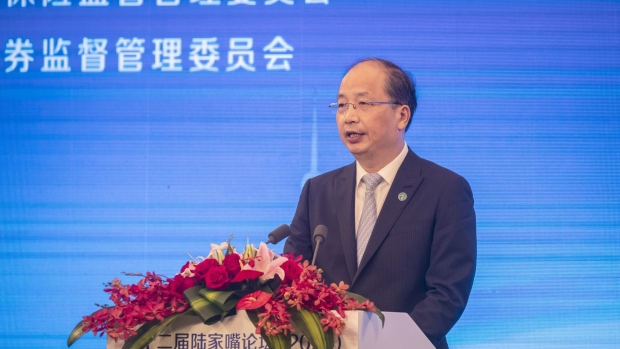Feb 16, 2023
China Poised to Appoint New Chiefs at Banking, Market Regulators
, Bloomberg News

(Bloomberg) -- China is poised to name regulatory veterans known for their strict campaigns against financial wrongdoing as new chiefs of the country’s banking and securities watchdogs, according to a person familiar with the matter.
Yi Huiman, the current chairman at the China Securities Regulatory Commission, is likely to be appointed to the same post at the China Banking and Insurance Regulatory Commission, putting him in the middle of a fraught balancing act to revive Asia’s largest economy while containing growing strains in the $60 trillion financial industry. Wu Qing, a vice mayor of Shanghai, is set to succeed Yi at the CSRC, said the person, asking not to be named as the information is private.
The appointments, which are typically announced around the annual legislative meeting in early March, could still be subject to change, the person said. Representatives from the CSRC, the CBIRC and the Shanghai government didn’t immediately respond to requests seeking comment.
The potential shifts come as Beijing is pushing for a consumption-led economic recovery after bruising years of Covid Zero policies and a broad crackdown on private businesses across technology, education and real estate. President Xi Jinping has stressed the need to safeguard financial system this year, especially preventing systemic risks that could stem from the embattled property sector, according to an article published Wednesday in the Communist Party’s Qiushi magazine.
The possible shake-up was hinted at in October when the party released its lists of members for the Central Committee, which is comprised of the nation’s most senior officials and political elites. The 58-year-old Yi was promoted to full membership on the committee, while Wu, 57, was elected an alternate member. Current top banking regulator Guo Shuqing, 66, was dropped off the lists. Ministerial officials in China typically retire at 65, though there have been exceptions.
“Yi did a good job at the CSRC, and it’s good to see his well deserved promotion of sorts,” said Chen Tonghui, managing director at Shenzhen Valley Asset Management Co. “I think as long as Wu can maintain that legacy, it bodes well for us stock investors.”
Banking Chief
Yi would assume office at a crucial time for the world’s largest banking system, which is grappling with the fallout from the ongoing property crisis and a surging pile of bad debt.
He is unlikely to depart from the hard-charging push by his predecessor. Guo, who is set to retire, had been on a crusade to clean up the banking industry, bringing to heel the once sprawling shadow banking market and cracking down on interbank leverage as well as fraud-riddled peer-to-peer lending before setting his eyes on financial technology behemoths such as Ant Group Co.
Since becoming the CSRC chairman in 2019, Yi has imposed record fines on insider trading, clamped down on illicit private equity funds, halted listing of Jack Ma’s Ant Group at the 11th hour, and scrutinized brokers’ businesses including margin-financing and cross-border trading by Chinese individuals.
Meanwhile, he oversaw a string of market-friendly reforms, including launching a new Nasdaq-style board for high-tech listings in Shanghai and trials of a registration-based initial public offering system. He also allowed foreign banks such as Goldman Sachs Group Inc. and JPMorgan Chase & Co. to take full ownership of their securities units in China.
Prior to that, Yi was chairman of the Industrial & Commercial Bank of China Ltd., the world’s largest lender by assets.
Zhiwu Chen, a professor of finance at the University of Hong Kong Business School, expects that Yi, given his experience in banking, will work well with He Lifeng, the incoming vice premier in charge of financial and fiscal matters, as well as incoming Premier Li Qiang. Both Li and Yi are from Wenzhou in the eastern Zhejiang province, he said, adding they have “some appreciation of practicality.”
But he said there will likely be no major changes to the path that has been set.
“Don’t expect big earth shattering changes to take place,” the professor said. Both Yi and Wu’s main job will be to just “keep the house in shape and not fall apart.”
New Markets Head
Yi’s successor, Wu, is no stranger to the markets. Before becoming vice mayor of China’s financial capital in 2018, he headed the Shanghai Stock Exchange for almost two years.
Prior to that, he worked in various roles at the CSRC, earning the nickname “the broker butcher” after shuttering 31 firms over regulation breaches while heading the Securities Company Risk Disposal Office from 2005 to 2009. He then earned the second moniker of “strike-hard director” when he oversaw the fund industry at the regulator until 2010.
Wu will now be mandated with pushing forward the nation’s financial opening to global banks and win back investors at a time of heightened geopolitical risks between China and the US. Wall Street firms had ramped up investments in China after the country allowed full foreign ownership of operations in 2020, but their efforts have been stymied by a slow and opaque approval process in the past two years.
Wu’s first test will likely be to oversee the rollout of a registration-based system for IPOs across all of China’s major trading venues. The program is set to ease the path for smaller firms to sell shares to the public, and could stoke volatility.
Another challenge he faces is to resolve the yearslong audit spat with the US, which forced delistings of ADRs of a few Chinese state-owned enterprises last year. Even though US officials signaled a breakthrough in late 2022 with their inspectors being able to sufficiently review audit documents of firms based in China and Hong Kong, more Chinese companies have joined an exodus from US bourses.
(Updates with comments from analysts starting in sixth paragraph.)
©2023 Bloomberg L.P.





